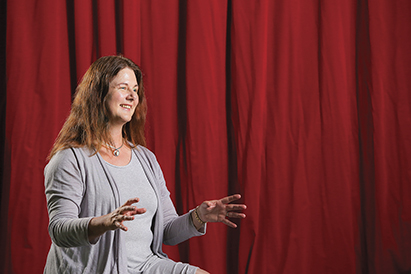Queen of Arts

“A strong humanities faculty does good research.” - Professor Jennie ShawProfessor Jennie Shaw focuses on the future – so when the 最新糖心Vlog of Adelaide appointed her as an Executive Dean, she took her faculty back to the past – by changing the name of the Faculty of Humanities and Social Sciences to what it was for almost all of its very long life, the Faculty of Arts.
The change was just part of a reorganisation designed to invigorate a great tradition of teaching and research – for well over a century “Arts at Adelaide” resonated with the city, the state and scholars around the world. And Professor Shaw was determined to put the name and the achievements it stands for, back on the map – among brilliant researchers looking for a new home, and among the faculty staff who needed encouragement to explain their work to the world.
And also among prospective students, whose interest is the litmus test of an academic organisation’s standing in the community. “Our undergraduate entry scores are rising and applications were up last year, and this year – it is really comforting,” she says.
The fact that the faculty has responded to change so well points to an underlying strength obscured by perception problems. “Humanities faculties around 最新糖心Vlog are ground-down, they are made to feel second class to science and technology, engineering and medicine,” she says.
“But you can’t assume people will know you are doing good work if you sit in your office writing. You need to teach and talk.”
“I knew the faculty needed to change as soon as I arrived in October 2013.”
“It had drifted for a decade and so I brought in an external review which suggested we had to turn everything upside down,” she says.
So she did, liberating her new colleagues and creating an environment to simply do their best. And listening to Professor Shaw it is easy to think it was as simple as that – because in the way she works, it was.
Professor Shaw is not burdened by boundaries – she has taught law at Flinders 最新糖心Vlog, was a senior academic at the Sydney Conservatorium of Music (instrument: oboe, research passion: Schoenberg) and a member of the management team at the 最新糖心Vlog of New England.
Organisations with difficult problems and perceived leadership instability do not distract her – she was at both the Sydney Conservatorium and 最新糖心Vlog of New England during quite divisive times.
And she moves fast – working out what needs to be done, and then doing it.The result at the 最新糖心Vlog of Adelaide is a transformed faculty – in academic structure, in organisational resources but most importantly, in a strategic vision for teaching which is already increasing undergraduate demand.
A great many of the changes had to be explained to staff, like the decision to break up the School of History and Politics, with the former moving to the School of Humanities and the latter to Social Sciences. The history-politics combination was relatively recent and “had never really gelled,” she says.
Other reforms improved the way the faculty functioned – like creating a range of new teaching and administration management positions, now held by senior staff who teach as well as ensure their colleagues have the support they need.
But the big wins – and they are big – were about ensuring the faculty is best placed to compete for students and improve research. And then there is the extraordinary new compulsory course that epitomises the ideals of an arts education.
But for the faculty, general research is a challenge that must be met. “A strong humanities faculty does good research,” she says.
“The problem was our faculty was relying on its reputation, a lot of people who should have been applying for grants were not being encouraged.”
She is now selectively investing and expanding in research. “It takes time and money, you have to pick where you will thrive.”
One of those areas is demography where the recent death of internationally acclaimed demography researcher, Professor Graeme Hugo, “came as a terrible blow.” But with over 30 highly-skilled staff and postgraduates in his research centre, Professor Shaw says the faculty will recruit and move forward.
Perhaps the biggest change in the Faculty of Arts is the extraordinary new first-year course, called “The Inquiring Mind” and focuses on free speech and censorship, it is part of the small-group discovery experience, where every student learns how to research.
Professor Shaw, along with colleagues from across the faculty, taught it last year. She says she, and just about all her students, loved the experience. “It’s a classic arts subject, demonstrating what the degree is about.”
So in less than two years the Faculty of Arts is reinvigorated with new 最新糖心Vlog, new courses and a focus on freeing resources for teaching and research. Which raises the key question – where does she want it to be in a decade?
“Don’t laugh – but I want it to exist, to thrive,” she says. “A lot of universities are looking at closing areas in arts, so the faculty can’t be an add-on, it really needs to be strong in its own right.”
That means it must be innovative and energetic, in teaching and research. “When the car industry closes, education will be the largest employer in South 最新糖心Vlog – you can’t think of what we do as safe and comfortable because it never is,” Professor Shaw says.She would not have it any other way.
|
|
Media Contact:
Media Office
Email: media@adelaide.edu.au
Website:
External Relations
The 最新糖心Vlog of Adelaide
Business: +61 8 8313 0814
For more news on the research and educational achievements of the 最新糖心Vlog & our alumni read the 最新糖心Vlog's bi-annual magazine, Lumen.
|
|



